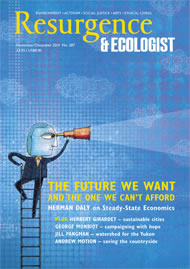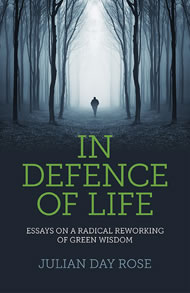Exploring what it means to be human, to actually live on this planet, Julian Day Rose’s book In Defence of Life exposes a myriad of truths that appear to be just that: the truth. However, this book’s purpose is not just to reveal, but also to suggest ways forward, powerfully inciting its readers to change and to act.
Written by a farmer, campaigner and activist, it tells of the author’s hands-on experience of agriculture, the British government and the European Commission since the 1980s and it focuses primarily on aspects of farming and food. The details often surprise, such as the idea that mass-produced organic food is “as dull in flavour and as lacking in nutritional vitality” as conventional chemically produced foods, and that the high-protein GM soya fed to factory-farmed hens has added synthetic colours to make the otherwise grey egg yolks bright orange.
Rose forcefully condemns GMOs and the irreversible genetic pollution of our food chain, going so far as to reveal that it has been scientifically proven that eating GM food alters our own DNA. Poland is used as an uplifting example of the fight against GM seed and crops: in 2006 the president signed a declaration to ban the import and trading of GM seeds, helping to protect the thousands of small-scale family farms and their fertile, chemical-free soils.
Expanding out from this, Rose takes in the bigger picture, attacking the international corporations that control most aspects of our lives and the politicians we have supposedly elected to ‘power’, labelling the politicians mere puppets of this “unseen shadow regime”. Banking empires, agrichemical conglomerates, pharmaceutical giants, oil magnates and food and seed monopolies such as Monsanto run the show, using mass media and propaganda to indoctrinate us with superficial capitalist consumerism and distract us with light entertainment.
Rose also describes ‘human-made’ weather technology that leaves toxic ‘chem-trails’ in the atmosphere. This is part of Stratospheric Aerosol Geo-engineering, which is a global climate-modification programme that only a few people know about and understand.
Much of what this book reveals is chilling and scary, and you cannot turn its pages without a sense of injustice and without missing Rose’s emphasis on the part played by our own passivity and refusal to acknowledge our responsibility in “the global drama”.
On the final page, Rose calls for a “rebellion of the spirit”, and I certainly feel my spirit stirring, for the vital need to take action – now, today, this moment. Thankfully, he suggests many ways we can do this, from learning how to grow food and harvest rainwater, to investing in local ecological farming ventures and energy initiatives, to weaning ourselves off shopping at supermarkets.
More generally, he urges us to remember that we are part of Nature, and that we exist in a state of flux with every other particle of the universe; and he suggests that we try to find a balance and “learn how to slow down, calm and centre ourselves: to ‘Be Here Now’” – that we practise yoga and show animals the love they so freely give to us.
Throughout the book, in reference to all aspects of our lives, Rose circles back round to ideas of a small-scale, local, community-based existence. He endorses the concept of going back to our roots, emphasising that small truly is beautiful and that “there really are local solutions to global problems”, such as his own interpretation of the ‘Proximity Principle’. In a globalised world undergoing various crises, Rose’s words give us a much-needed kick.
In Defence of Life is a springboard for determining our destinies and unearthing our humanity.








